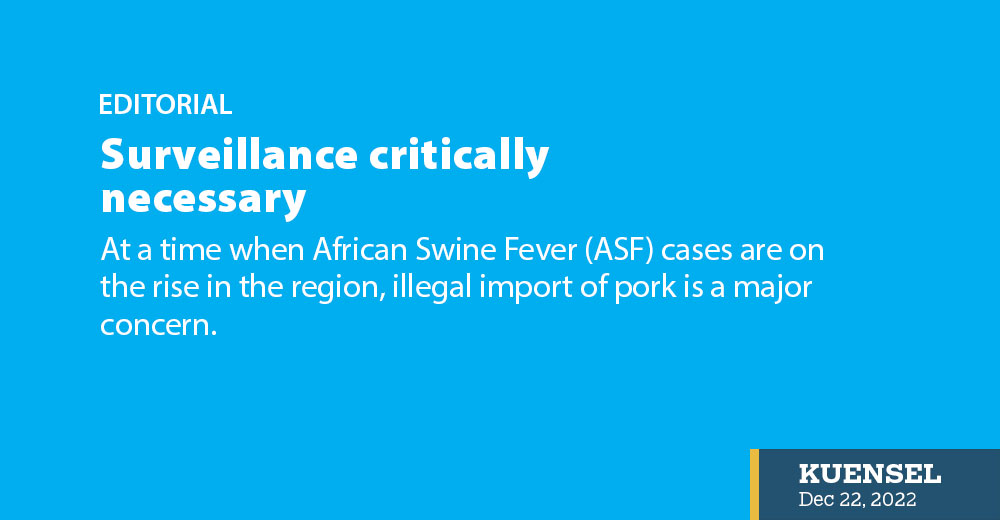At a time when African Swine Fever (ASF) cases are on the rise in the region, illegal import of pork is a major concern.
ASF is a highly contagious viral disease of pigs. In its acute form, the disease generally results in high mortality. Thankfully, the virus does not affect people and there is no impact on human health. However, there is a huge economic impact on farmers.
ASF can spread through direct contact with infected pigs, faeces or body fluids; indirect contact via fomites such as equipment, vehicles or people who work with pigs between pig farms with ineffective biosecurity; pigs eating infected pig meat or meat products; and biological vectors.
The first case of ASF was reported in Bhutan on May 13 in roaming pigs in Phentsholing. On April 15, a new ASF outbreak occurred on a semi-commercial pig farm in Sampheling, Chukha. In early November, outbreaks were confirmed in Pemathang and Dewathang in Samdrupjongkhar. Recently, cases have been confirmed from in three domestic pig farms in Sarpang.
In less than a month, Gelephu Thromde’s Incident Operation Centre officials seized and disposed of 280 kilograms of illegally imported pork from across the border.
However, the cases continue to rise despite Ministry of Agriculture and Forests banning the slaughter of pigs and movements and sale of pig products until further notice. The ministry announced on December 15 that those in breach of the notification would be fined ten times the market value of the seized pork products.
What we know is that the outbreak in Bhutan is caused by the illegal import of contaminated pork and spread through kitchen wastes supplied by hoteliers or restaurants to pig farms. Currently, the movement of all other livestock products originating from the integrated farms of Sarpang to other places is also restricted
But the issue of serious concern is non-adherence to the notifications despite repeated awareness programmes and notifications issued by the concerned authorities. Pig farms are being asked to heighten biosecurity in their farms, stop feeding kitchen waste, prevent domestic pigs from coming into contact with wild pigs and report suspicious deaths to the nearest livestock centres or the Bhutan Agriculture and Food Regulatory Authority.
Inspection of hotels and restaurants must continue. Illegal import and slaughtering of pigs in the dzongkhag should be outlawed until further notice, for the benefit of pig farmers.


